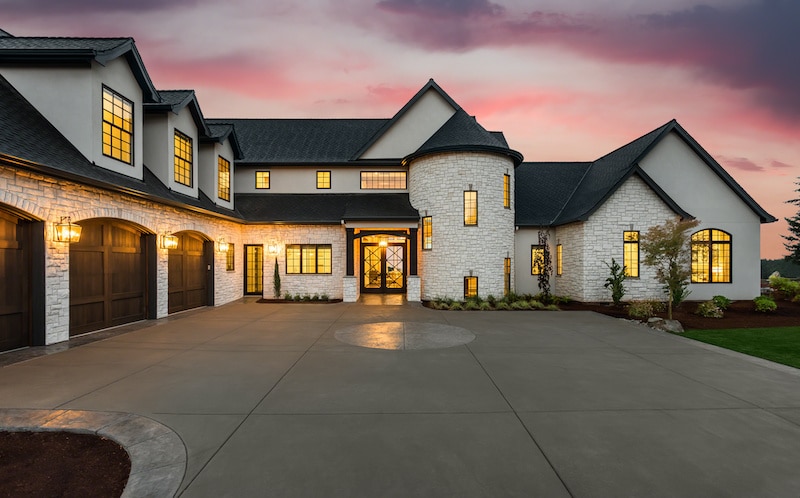Jumbo home loans, also known as non-conforming conventional mortgages, are loans specifically for mortgage amounts that exceed the limits set by Fannie Mae and Freddie Mac, two of the largest government-sponsored enterprises that buy most of the home loans in United States. Basically, jumbo mortgages are designed for buyers looking at high-value properties. Let’s discuss the specifics of jumbo loans, who qualifies, and the process of getting one.
Competitive Rates
We work tirelessly to keep our costs down and pass the savings on to you. This enables us to offer exceptional loans and competitive rates that our competitors can’t match.
Same-Day Pre-Approvals
Get reliable same-day pre-approvals with us. Apply now and discover your personalized loan approval quickly and effortlessly.
A+ Rating with BBB
Our clients’ satisfaction speaks for itself. We’re proud to hold the highest possible rating with the Better Business Bureau, a testament to our commitment to excellent customer service.
What Is a Jumbo Home Loan?
Jumbo home loans are mortgages designed to finance properties that are larger-than-normal in terms of loan amount. These non-conforming conventional mortgages, or jumbo mortgages, are used to finance the purchase of primary residences, investment properties, and vacation homes that are of high value or to refinance existing loans.
So, what qualifies as a larger-than-normal mortgage amount? According to the Federal Housing Finance Agency (FHFA), the national conforming loan limit for mortgages varies based on location and is determined by a formula established under the Housing and Economic Recovery Act of 2008 (HERA). You can check the FHFA’s 2021 limits by county on the FHFA website.
Generally, however, the loan limit for most of the country is around $548,250. This amount is higher for different areas of the country, such as California, New York, Alaska, and Hawaii. Homes that exceed the conforming loan limit for the county they’re located in will require a jumbo home loan to finance.

Why Are Jumbo Loans Required for High-Value Properties?
Most loans in the US are guaranteed by government-backed institutions like Fannie Mae and Freddie Mac. These enterprises help protect the lender against losses in the event that borrowers default on their loans. That said, Fannie Mae and Freddie Mac do not back loans that exceed the conforming loan limit. This means that if a borrower defaults on a mortgage for a property valued higher than the conforming loan limit established for the area, lenders would be left unprotected.
Enter jumbo loans. As a result of the higher risk posed to lenders, jumbo loans are offered by fewer lenders, can have higher rates, and can be more difficult to qualify for. Outside of those factors, jumbo mortgages are fairly similar to conventional mortgages. They are offered with both fixed or adjustable rates and have variable term options.

The Pros and Cons of Jumbo Loans
With a jumbo loan, borrowers are able to finance larger amounts. This can be beneficial both in terms of affording larger homes and as a part of a strategic investment strategy.
However, there are disadvantages to jumbo loans. For starters, jumbo home loans tend to require larger down payments, amounting to at least 20% for many lenders but as low as 10% for others. This is because of the high level of risk involved in financing such high amounts.
Jumbo mortgages can also potentially have higher interest rates than conforming loans. Of course, this depends on the lender and the borrower’s specific financial situation. Next, jumbo loans are also more difficult to qualify for. This is often not an issue for borrowers with high incomes, high credit scores, and low debt-to-income ratios, but it can be a struggle for conventional borrowers who live in areas with very high home values. Finally, many jumbo mortgages require higher closing costs than conventional mortgages.
Jumbo Home Loan Requirements & Process
Because the loan amounts that jumbo mortgages finance are much larger and more risky to finance than those of conventional loans, qualifying for a jumbo home loan is more difficult. There are fewer lenders that offer jumbo loans and, as a result, borrowers are limited to the remaining lenders’ specific (and often stricter) qualifications.
The qualifications listed above may vary depending on the lender, so it’ is always good to do your research and compare offers from different lenders. However, keep in mind that there are fewer lenders out there that offer jumbo home loans.
In order to receive approval for a jumbo home loan, you’ll need to meet certain requirements. They include:
-
High credit score.
Most lenders require a FICO® credit score of higher than 700 (sometimes even upwards of 720).
-
Low debt-to-income ratio.
Many lenders require a debt-to-income ratio of 45% or less, but some may be flexible if the borrower has larger cash reserves.
-
High cash reserves.
Many jumbo loan lenders only approve mortgages if borrowers have a large amount of cash reserves (or liquid assets) in the bank.
-
Adequate financial health documentation.
To prove that the borrower can afford the mortgage payments, many lenders require extensive financial health documentation such as proof of income, bank statements, investment account information, and more.
-
Property appraisals.
Jumbo mortgage lenders often require their own appraisal of the property to assess the value of the home before financing.

Benefits of Choosing The Home Loan Expert for Your Jumbo Loan
When you finance your jumbo loan through The Home Loan Expert, you’ll benefit from:
- Down payments as low as 10%
- Having your choice between fixed- and adjustable-rate options
- Loan amounts as high as $6 million
- Ability to use alternative income documentation (bank statements, 1099s, profit and loss statements)
- And more!
Let The Home Loan Expert Help!
For buyers in the market for a jumbo loan, there are many factors to consider and options to weigh. However, the process doesn’t have to be difficult. By partnering with an experienced home loan Expert, home buyers can more easily buy or refinance their dream home with a jumbo mortgage.
At The Home Loan Expert, our team is unmatched when it comes to helping borrowers understand jumbo loans, find the right loan for their needs, and qualify. We’ll walk you through the process step by step, ensuring that you understand everything and get your loan closed on time.
Even better, with our easy-to-use mortgage calculator, you can easily get an idea of the various loan options available to you. And our team is always ready to help! Contact us to see how easy owning a high-value home can be!
Learn About Other Loan Types
Adjustable Rate Mortgage
When you’re shopping for a new home, one of your most important decisions will be what kind of mortgage to take out to finance your home. Your mortgage type will be the top factor that influences how much you can borrow(and thus what kind and size of home you purchase), as well as your monthly budget moving forward. For a variety of reasons, an adjustable-rate mortgage (ARM) can be an appealing choice in the short term, but it can seem scary as well. However, it’s important to understand how ARMs work, since this type of loan has repayment terms that may become less desirable over time.
FHA Loan
The home buying process can be overwhelming and stressful, especially if you’re buying your first home (or if your financial circumstances make it more difficult to get an affordable loan). For many home buyers, getting a loan insured by the Federal Housing Administration (FHA) can be extremely helpful in not only securing the necessary financing to buy but also achieving the dream of owning a home (even while facing tough financial situations). FHA loans allow lenders to make home buyers better deals, resulting in lower down payments, lower closing costs, and easier credit qualifying. Here, we’ll go over the ins and outs of FHA loans, including what they are, who qualifies, and what the process of securing one looks like.
Fixed-Rate Loans
Fixed-rate mortgages—also called “conventional mortgages”—are basically the bread and butter of the mortgage industry. And that’s because this loan type is still the most reliable way to finance your home, offering affordability, flexibility, and so much more. As their name suggests, fixed rate loans have the same rate throughout the entire term of the loan. So even if interest rates rise while you’re paying off your loan, your rate and payment amount are locked in for the entire loan term. That’s why fixed-rate mortgages are so popular–they offer protections that ARMs can’t.


